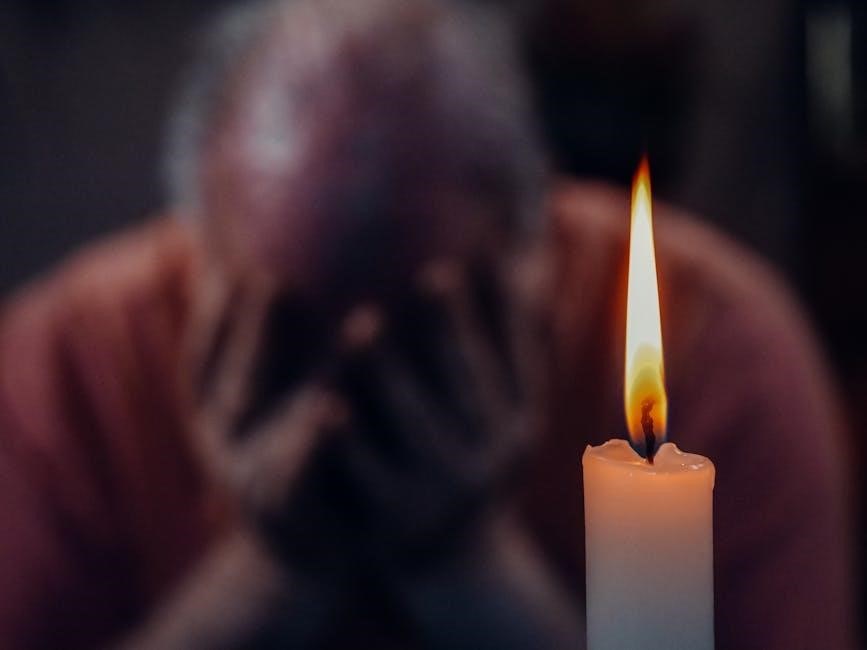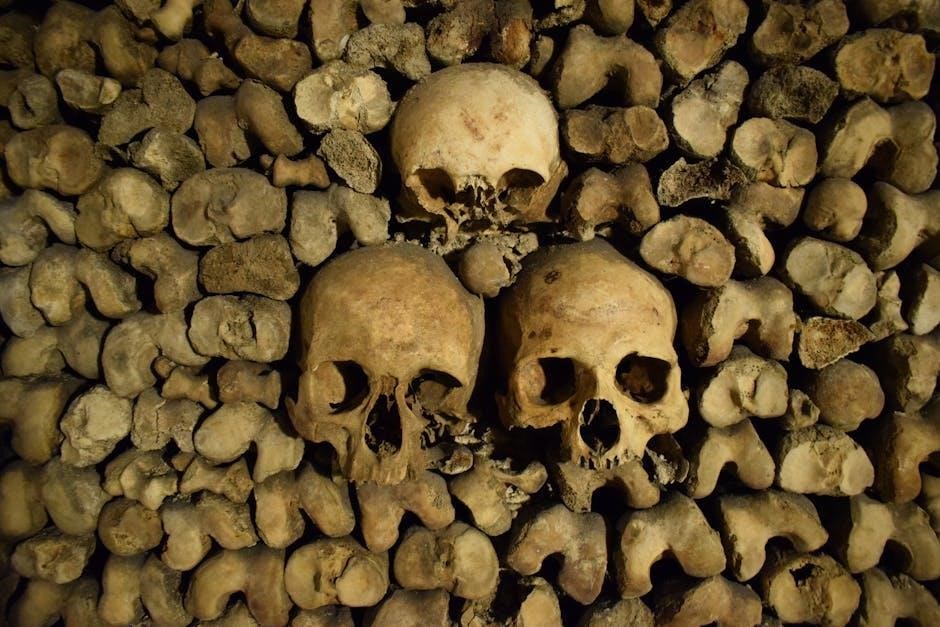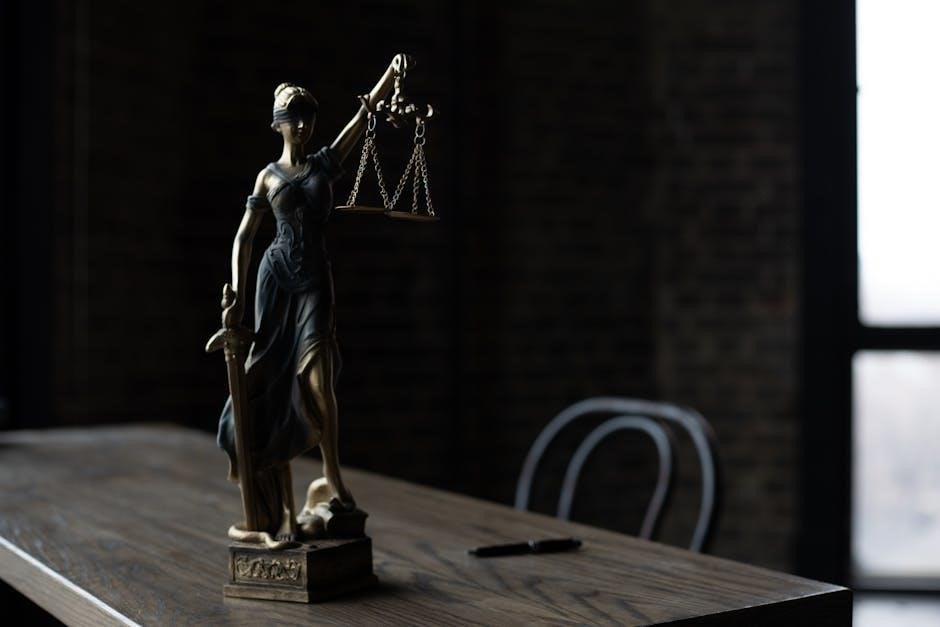The trial and death of Socrates, as documented in Plato’s dialogues, remain a pivotal moment in Western philosophy, exploring justice, morality, and the ideals of civic duty.
1.1 Historical Context of Socrates’ Trial
The trial of Socrates occurred in 399 BCE, a tumultuous period in Athens following the Peloponnesian War. The city was rebuilding its democracy after years of conflict and oligarchic rule. Socrates, a prominent philosopher, faced charges of impiety and corrupting the youth, reflecting tensions between traditional religious values and emerging philosophical inquiry. His teachings questioned authority and encouraged critical thinking, which some Athenians viewed as a threat to social stability. The trial was delayed due to the sacred ship’s return from Delos, a religious observance. This context highlights the intersection of political, religious, and philosophical tensions in ancient Athens, setting the stage for Socrates’ tragic fate.
1.2 The Significance of the Trial in Western Philosophy
The trial and death of Socrates hold profound significance in Western philosophy, symbolizing the conflict between authority and free inquiry. His defense of philosophy as a way of life emphasized critical thinking and moral responsibility. Through Plato’s dialogues, Socrates’ ideas endured, shaping Western thought on ethics, justice, and the pursuit of wisdom. The trial underscores the tension between individual conscience and societal expectations, making it a cornerstone of philosophical discourse. Socrates’ legacy, particularly his method of questioning, remains central to education and intellectual inquiry, ensuring his influence continues to resonate across centuries. His death, seen as a martyrdom for truth, cemented his iconic status in the history of philosophy.

The Key Dialogues by Plato
Plato’s dialogues, including Euthyphro, Apology, Crito, and Phaedo, provide a philosophical account of Socrates’ trial, defense, and death, offering insights into his teachings and legacy.
2.1 Euthyphro: The Pre-Trial Conversation
The Euthyphro dialogue takes place before Socrates’ trial, where he encounters Euthyphro, a man claiming piety. Their conversation explores the nature of morality and divine authority, highlighting Socrates’ method of questioning to uncover truth. Euthyphro’s confidence in his religious knowledge contrasts with Socrates’ humility, setting the stage for the trial’s themes of justice and obedience. This dialogue underscores Socrates’ commitment to critical thinking and his belief that true wisdom lies in recognizing one’s ignorance. It serves as a precursor to the events in Apology, foreshadowing the philosophical debates that will unfold during his defense.
2.2 Apology: Socrates’ Defense Speech

In the Apology, Socrates delivers his defense against charges of impiety and corrupting the youth. He argues that his actions are divinely ordained, emphasizing his mission to seek wisdom and expose ignorance. Socrates maintains that he cannot abandon philosophy, even if it leads to death, as it is his duty to question and guide others. When asked to propose a penalty, he provocatively suggests public support for his work, reflecting his unwavering commitment to truth. The dialogue showcases his method of questioning and his belief in the immortality of the soul, setting the foundation for Western philosophical debates on justice, morality, and the ideal life. His defense not only defines his legacy but also underscores the tension between individual conscience and societal expectations.
2.3 Crito: The Debate on Escaping Death
In the dialogue Crito, Socrates is visited in prison by his wealthy friend Crito, who offers to bribe the guards and secure his escape. Socrates, however, refuses, arguing that escaping would violate the laws of Athens, which he has implicitly agreed to by living there. He believes that breaking the law would undermine justice and harm the city. Socrates also expresses his willingness to accept the death sentence, viewing it as the just outcome of his trial. The dialogue explores themes of obedience to authority, the morality of civil disobedience, and the importance of adhering to one’s principles, even in the face of death. It highlights Socrates’ unwavering commitment to justice and his belief in the immortality of the soul.
2.4 Phaedo: The Final Hours and Death of Socrates

Phaedo recounts Socrates’ final hours, focusing on his conversations with friends in prison. The dialogue centers on the nature of the soul and the concept of immortality. Socrates argues that the soul exists before birth and will continue to exist after death, suggesting that death is merely the separation of the soul from the body. He expresses no fear of dying, believing it to be a natural process. The dialogue also describes the emotional reactions of his followers, contrasting their grief with Socrates’ calm acceptance. The text ends with his ingestion of hemlock, followed by his death, marking the culmination of his philosophical journey and leaving a lasting legacy in Western thought.

The Trial of Socrates
The trial of Socrates was a legal proceeding in ancient Athens, driven by charges of impiety and corrupting the youth, reflecting societal and political tensions.
3.1 The Charges Against Socrates
The charges against Socrates were rooted in accusations of impiety and corrupting the youth. He was alleged to have introduced new divine beings and questioned the state’s religious practices. Additionally, his method of questioning and dialogue led critics to claim he undermined traditional values, encouraging young men to challenge authority. These charges were brought by a group of Athenian citizens, reflecting broader societal tensions and political dynamics. The trial highlighted the clash between Socrates’ philosophical ideals and the city’s legal and religious norms, setting the stage for a landmark judgment that would shape Western philosophy’s history.
3.2 The Trial Procedure in Ancient Athens
The trial of Socrates followed the legal procedures of ancient Athens, where citizens played a significant role in the judiciary system. The trial began with formal charges brought by citizens, followed by a preliminary hearing to determine if the case merited a full trial. During the main trial, Socrates acted as his own defense, delivering speeches captured in Plato’s Apology. A jury of 501 citizens voted on guilt and punishment. Socrates was found guilty by a narrow margin, and the penalty was debated, with death ultimately chosen. The trial’s outcome was influenced by Athenian democracy’s emphasis on majority rule and the societal context of the time.

Socrates’ Defense and Philosophy
Socrates defended himself by asserting his divine mission to seek wisdom and question authority. His philosophy emphasized justice, obedience to conscience, and the pursuit of self-examination.

4.1 Socrates’ View on Justice and Obedience
Socrates believed justice was a universal truth, transcending human-made laws. He argued that true justice required individuals to act virtuously, even if it meant disobeying unjust laws. During his trial, he emphasized that his actions were divinely ordained, making him accountable to a higher authority than the state. Socrates viewed obedience to conscience as paramount, asserting that one must not follow laws that contradict moral principles. His refusal to escape prison, despite the opportunity, demonstrated his commitment to respecting the legal process, even when it led to his death. This philosophy has deeply influenced Western thought on morality, justice, and civic responsibility.
4.2 The Concept of the “Examined Life”

Socrates famously declared that “the unexamined life is not worth living,” emphasizing the importance of self-reflection and critical inquiry. He believed individuals must continually question their beliefs and actions to achieve wisdom and virtue. This concept, central to his philosophy, was demonstrated through his method of questioning, where he engaged others in dialogue to expose contradictions and encourage deeper thinking. Socrates saw this process as a divine mission, believing it essential to uncover truth and promote moral understanding. His commitment to this ideal led him to accept death rather than abandon his pursuit of wisdom, leaving a lasting legacy in Western philosophy. His philosophy remains a cornerstone of ethical inquiry and intellectual curiosity.

The Legacy of Socrates’ Death
Socrates’ death solidified his influence on Western philosophy, inspiring future thinkers and emphasizing the importance of standing by principles. His legacy endures as a symbol of intellectual courage and moral integrity.
5.1 The Impact on Western Philosophy
Socrates’ death had a profound impact on Western philosophy, cementing his legacy as a martyr for free thought. His method of questioning, the Socratic method, became a cornerstone of philosophical inquiry and education. Through his pupil Plato, Socrates’ ideas influenced nearly all subsequent philosophical movements, from Aristotle to modern thinkers. His emphasis on ethics, self-examination, and the pursuit of wisdom reshaped how humanity views morality and knowledge.Ironically, his execution silenced him but amplified his teachings, ensuring their enduring relevance. Socrates’ legacy continues to inspire philosophers, challenging them to question authority and seek truth, making him one of history’s most influential figures.
-
5.2 The Symbolism of His Death in Modern Thought
Socrates’ death symbolizes the ultimate defense of free thought and intellectual freedom in modern thought. His willingness to accept death rather than abandon his principles has become a powerful metaphor for standing against oppression. Modern interpretations often portray Socrates as a martyr for truth, embodying the idea that conscience and reason should guide individuals, even in the face of societal pressure. His execution serves as a reminder of the tension between individual freedom and state authority, resonating in debates about censorship, dissent, and the pursuit of justice. Socrates’ death continues to inspire resistance against systems that suppress critical inquiry and individual expression.

